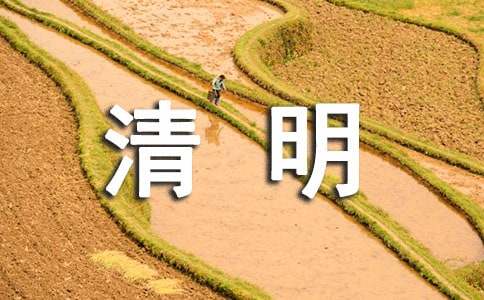中学生关于清明节的英语演讲稿范文
Qing Ming, which means clear and bright in Chinese, falls on April 5th this year. It is both the fifth term in the traditional lunar calendar and a festival to hold memorial ceremony for the dead. It is a time to express one's grief for his lost relatives. An ancient elegiac poem, which described a grievous woman, was read that vines tangled in vain and weeds crept in the graveyard, and her husband slept there lonely. It was so difficult to endure for her as if summer in the day and winter at night. And her only wish was to reunite with him after death.

People often go to sweep and weed graves with whole family and take a walk in the countryside as well. In Tang Dynasty, the habit of taking an excursion on this day was developed. At this time, spring returns and dominates the earth again. The feel of growing life is in the air, with sap ascending in trees and buds bursting. And the willow branches inserted on each gate add vigor and vitality to the surroundings. But it actually means more than that. This custom can be traced back to over one thousand years ago.
During the Period of Spring and Autumn in the Jin Kingdom, one of the King's sons was called Chong Er. Jealous of his talent, a concubine falsely accused him of rebellion to make her son the crown prince. He had no choice but to flee and with him were some officials. They hid themselves in a mountain and went hungry for quite some time. An official named Jie Zitui took great pain to cut some flesh from his thigh and cooked it for Chong Er. When the fact was known the young master was moved to tears and knelt down in gratitude. And Jie replied his best repayment should be a just king. They lived a life of hunger and cold for three years until the evil concubine died. Many soldiers were sent to look for him and to escort him back home. Going into the carriage, he saw an official packed an old mat onto a horse, he said laughingly, 'What on earth is the use of that? Throw it away!' Jie Zitui heard it and sighed, 'It is hardship that can be shared with his majesty but not prosperity.' So he went away quietly and lived in seclusion with his old mother.
As Chong Er became king, he rewarded many people but he forgot Jie Zitui. He did not realize it until was reminded. However his invitation was refused and he flared up. Soldiers were ordered to burn up the mountain to force Jie to come out. Finally they found Jie and his mother scorched under a willow. He would rather die than yield to the power. Chong Er was so overwhelmed with regret that he ordered people hold memorial ceremony for Jie. So every year on that day folks mourned for him and the day before ate cold meals, which avoided making fire. Later the custom of inserting willow branches on gates was also added.
清明节,这意味着清晰和明亮,落在今年4月5日。这是第五学期在传统的农历和节日为死者举行纪念仪式。这是一个时间来表达一个失去亲人的悲痛。一个古老的挽歌诗,描述了一个严重的女人,阅读,藤蔓缠绕徒然和杂草爬在墓地,和她的丈夫睡在那里孤独。好像是如此难以忍受她晚上当天夏季和冬季。和她唯一的愿望就是死后与他团聚。
人们经常和全家一起去扫描和杂草坟墓和散步在乡下。在唐代,采取一次短途旅行的习惯在这一天。在这个时候,春天的回报并再次主宰地球。成长的感觉生活是在空中,与sap提升在树木和味蕾破裂。和柳枝插在每个门增添生机与活力的环境。但它实际上意味着更多。这种风俗可以追溯到一千多年前。
春天和秋天期间金王国,国王的一个儿子名叫Chong Er。嫉妒他的才华,妾诬告他的反抗让她的儿子皇太子。他别无选择,只能逃跑,被一些官员。他们躲在一个山,走饿了很长一段时间。一位官员名叫介子推了巨大的痛苦减少一些从他的大腿肉和煮熟的Chong Er。当事实被年轻的主人,跪下来感激感动得落下了眼泪。和杰回答说他最好的回报应该是王。他们过着饥饿和寒冷的生活了三年,直到邪恶妾死了。许多士兵被派去寻找他,护送他回家。进入马车,他看见一位官员老席上一匹马,他笑着说,“那到底是使用什么?扔掉它!介子推听见了,叹了口气,“这是困难,可以与他的威严但不能共享繁荣。所以他平静地走了,住在和他的老母亲隐居。
作为Chong Er作王,他的回报很多人但他忘了介子推。他才意识到这是提醒。然而他的邀请被拒绝,他突然爆发。士兵被命令烧上山迫使揭出来。最后他们发现杰和他的母亲烧焦的柳树下。他宁死也不屈服于权力。重耳略遗憾所淹没,他命令人们为杰举行纪念仪式。所以每年在这一天人们为他哀哭和前一天吃寒冷的食物,避免使火。后插入柳枝的习俗在盖茨还补充说。